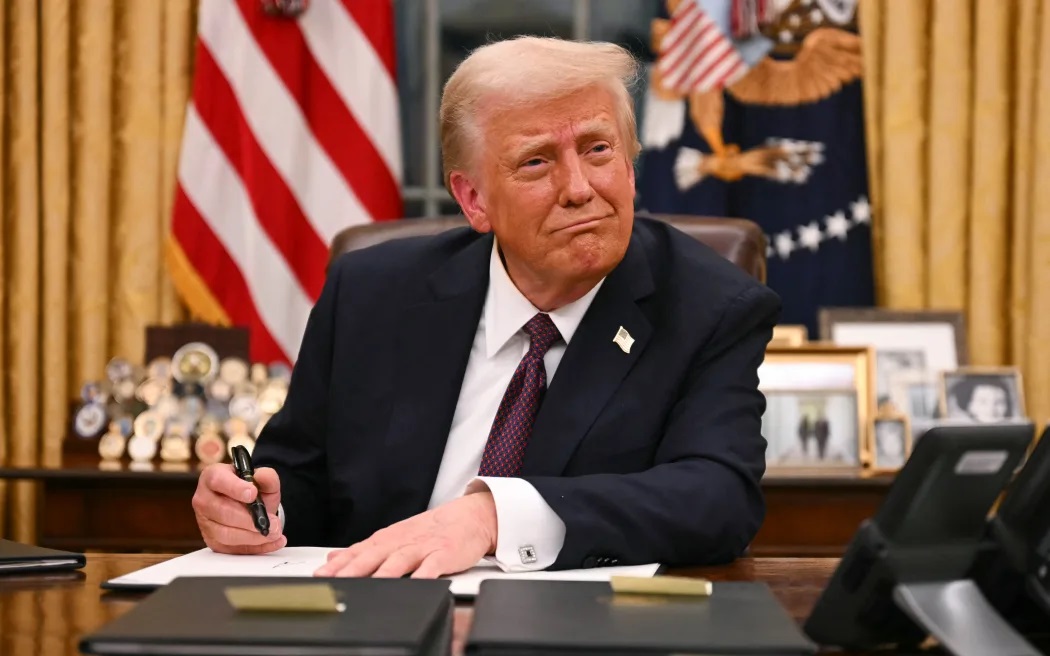What to expect from Netanyahu’s visit with Trump

Since Donald Trump returned to the White House for a second term, global, regional and domestic changes have been accelerating at an unprecedented pace. Trump's inaugural speech and his deluge of executive orders exemplify a nationalist rhetoric, which includes barring student visas of those who participated in "pro-Palestinian" protests that shook the country last year. He heralded "a golden age," in his inaugural address, and his policies have put Washington—and the rest of the world—on notice that Trump is determined to turn his campaign promises into reality. His promises come with a liking of openly self-serving agendas. Nowhere is this more evident than in his administration's approach towards the Middle East, which is defined by a complete bias for Israeli expansionism at the expense of Palestinians.
The policy not only disregards Palestinian rights but also strengthens Israeli hegemony, offering illusions through hardline figures such as Massad Boulos and Steve Witkoff. Under Trump's first administration, the US showed no interest in supporting the establishment of an independent Palestinian state, further exacerbating Palestinian suffering and pushing towards the dissolution of the cause. This time, evidently, will be no different. Israeli Prime Minister Benjamin Netanyahu's visit and upcoming discussions with Trump raises questions, and mostly concerns, about what lies ahead. The ceasefire is currently in a fragile state, held in the Gaza Strip with the next stage of negotiations expected to enter the second phase that includes a more permanent end to the conflict.
Netanyahu, the first foreign leader to meet Trump at the White House, will undoubtedly try to preserve a dynamic between the nations where absolutely no threats for Netanyahu's position as the Prime Minister of Israel, and ensure there are no checks and balance for his government—given those members are "loyal" to him. It is the same dynamic that resulted in the Abraham Accords. In this context, it is important to remember that Netanyahu's decision in Israel has not been in the interest of the Israeli public, majority of whom do not approve of him. He dragged the war on for political gains, and got rid of anyone who objected to his decisions, in order to serve his personal interests, starting with the opposition duo Benny Gantz and Gadi Eisenkot, then Defence Minister Yoav Gallant, and finally the chief of staff who was replaced by Netanyahu's most loyal commander.
He closed the gaps that disturbed him and confused his absolute rule under the pretext of achieving absolute victory. When speaking to Trump, Netanyahu's logic that "I am Israel" will inarguably dominate. His expansionist aims will be presented, days after Trump has offered—and been rejected—to relocate Palestinians from Gaza to Egypt and Jordan.
Netanyahu's equation with Trump in his first term doubled Israel's dependency on US financial, armed and political wars, and will remain a constant threat to the Middle East, a region whose map both leaders want to change, and the region where they presume authority to throw around citizens and people across borders.
False promises and intermediary characters
Massad Boulos, a billionaire of Lebanese origin and the father-in-law of Tiffany Trump, played a role in crafting deceptive assurances to the Palestinians, suggesting there was a real opportunity for political relief under the Trump administration. These promises follow a long-standing US pattern of selling illusions to Palestinians, offering grand economic or political solutions without any substantive commitments.
Similarly, Steve Witkoff, US billionaire real estate investor and Trump's Middle East envoy, sought to position himself as a mediator, even reportedly visiting Gaza. However, these gestures will only remain as mere theatrics that fall in line with the administration's broader policies that actively reinforce Israeli occupation, settlement expansion, and annexation projects.
Israeli hegemony as a pillar of US strategy
The US-Israel alliance is deeply rooted in strategic interests, making the idea of an independent Palestinian state fundamentally at odds with Washington's long-term vision of "peace" in the Middle East. Israel serves as the linchpin of US influence in the region, and as such, Trump's policies, including his support for Israeli settlements, the relocation of the US embassy to Jerusalem, and the recognition of Jerusalem as Israel's unified capital confirm that Washington sees the continuation of Israeli hegemony as a long-term strategic goal.
In the same vein, the Trump administration brokered a truce between Hezbollah and Israel that pushed the deadline for the complete withdrawal of the Israeli occupation forces from Lebanon, further extending Israel's military presence in the country. Trump has completely sidelined Jordan from his strategic calculations, seeking to impose an economic blockade to pressure Amman into aligning with his regional agenda, most notably, by forcing Jordan to absorb Palestinians from Gaza. That is a revival of a proposal that Jordan rejected during Trump's first term, which is now being pushed again through economic coercion, including threats to cut aid.
At the same time, US officials such as Ambassador Mike Huckabee and the US ambassador to the UN have openly championed Israel's "biblical right" to the West Bank. Huckabee, a hardline Anglican, refuses to call the Israeli communities in the West Bank "settlements." The US ambassador to the UN has echoed similar sentiments, reflecting the depth of the indoctrinated anti-Palestinian beliefs in US decision-making.
Trump's policies and his supporters
Trump's support for Israel cannot be separated from his electoral base, which largely consists of Zionists and Evangelical Christians. These groups see support for Israel as a religious and ideological duty. For them, the "Greater Land of Israel" is part of their faith. The usage of religion to occupy land, unfairly, played a major role in pushing the Trump administration to adopt policies that serve the entire Israeli occupation project at the expense of Palestinian human rights.
Since assuming office, Trump has lifted sanctions on Israeli settlers, removed bans on bomb shipments to Israel, and endorsed proposals advocating for the forced transfer of Palestinians under the guise of "evacuating areas."
If we look at Trump's policies realistically, it is clear that his administration is interested in pushing for Israeli hegemony,
Trump's transactionalism
Trump approaches international issues, including the Palestinian cause, through the lens of transactionalism. Rather than addressing the political roots of conflicts or seeking justice, he perceives the region as an opportunity for economic profit. His statements referring to Gaza as a "fantastic place" exemplify his reductionist perspective, trivialising the unimaginable suffering of the Palestinians in Gaza for the past year and a half. Similar to Netanyahu, Trump has also reduced the Palestinians' struggle to a mere commercial project and their land to a profit-making machine. These policies, coated in political hypocrisy, only deepen the suffering of the Palestinian people.
Given this stark reality, it is imperative that we Palestinians, and Palestinian supporters around the world, unite according to a clear strategic vision and work to realign internal political and diplomatic priorities to confront the growing challenges. As the ceasefire in Gaza hangs in the air, the Israeli military, for its part, has shifted its focus over the past two weeks to the West Bank, carrying out airstrikes and blowing up 23 buildings in Jenin on Sunday. If Trump and Netanyahu work to foster the problematic US-Israeli equation that has underlined the conflict with Palestine, the Middle East will only plunge into further unrest. The only hope lies in Trump's economic interests with the Arab states and gulf nations overriding his penchant for far-right nationalists like Netanyahu. The coming days will reveal the future of Gaza in the short-term at least, but that itself is the issue: the future of the besieged strip lies in the hands of two men who, above all, care mostly about themselves.
Yousef SY Ramadan is the ambassador of Palestine to Bangladesh.
Views expressed in this article are strictly the author's own.
We welcome your contributions and analysis of global events, and responses to our articles. To submit articles to Geopolitical Insights, please send an email to ramisa@thedailystar.net.
Follow The Daily Star Opinion on Facebook for the latest opinions, commentaries, and analyses by experts and professionals. To contribute your article or letter to The Daily Star Opinion, see our submission guidelines.




 For all latest news, follow The Daily Star's Google News channel.
For all latest news, follow The Daily Star's Google News channel. 

Comments